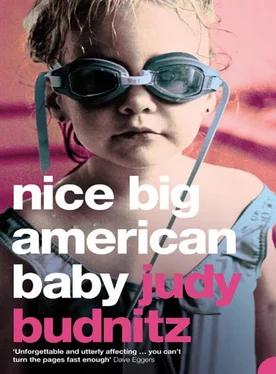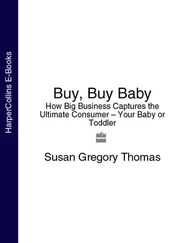I made that soup for you, my mother said. The one where I have to peel the tomatoes and pick all the seeds out by hand.
Mother. I wish you wouldn’t do that.
You mean you don’t like it? I thought you liked it.
I like it, I like it. But I wish you wouldn’t bother.
It’s no bother. I wanted to.
She was up until two in the morning pulling skin off tomatoes, my father said. I could hear them screaming in agony.
How would you know? You were asleep, my mother said.
I get up at five-thirty every morning to do work in the yard before I go in to the office, he said.
I looked out at the brown yard.
I’ve been pruning the rosebushes. They’re going to be beautiful next summer.
Yes, they will.
Lisa, he said, I want you to do something for me tomorrow, since you’re here.
Sure. Anything.
I want you to go with your mother to her doctor’s appointment. Make sure she goes.
OK.
She doesn’t have to come, my mother said. That’s silly, she’ll just be bored.
She’s supposed to get a mammogram every six months, my father said, but she’s been putting it off and putting it off.
I’ve been busy. You know that’s all it is.
She’s afraid to go. She’s been avoiding it for a year now.
Oh, stop it, that’s not it at all.
She always finds a way to get out of it. Your mother, the escape artist.
My mother crossed her arms over her chest. There was a history. Both her mother and an aunt had had to have things removed.
It’s the same with all her doctors, my father said. Remember the contact lenses?
That was different. I didn’t need new contacts.
She stopped going to her eye doctor for fifteen years. For fifteen years she was wearing the same contacts. When she finally went in, the doctor was amazed, he said he’d never seen anything like it, they don’t even make contact lenses like that anymore. He thought she was wearing dessert dishes in her eyes.
You’re exaggerating, my mother said.
Mitch—I mean Lise, my father said.
He’d always gotten our names confused; sometimes, to be safe, he just said all three.
She’s afraid to go because of the last time, he said.
What happened last time? I said.
I had the mammogram pictures done, she said, and then a few days later they called and said the pictures were inconclusive and they needed to take a second set. So they did that and then they kept me waiting for the results, for weeks, without telling me anything, weeks where I couldn’t sleep at night, and I kept your father up too, trying to imagine what it looked like, the growth. Like the streaks in bleu cheese, I thought. I kept feeling these little pains and kept checking my pulse all night. And then finally they called and said everything was fine after all, there was just some kind of blur on the first X-rays, like I must have moved right when they took them or something.
You were probably talking the whole time, my father said. Telling them how to do their job.
I was probably shivering. They keep that office at about forty degrees and leave you sitting around in the cold in a paper robe. The people there don’t talk to you or smile; and when they do the pictures they mash your breast between these two cold glass plates like a pancake.
My father looked away. He had a kind of modesty about some things.
My mother said to me, All those nights I kept thinking about my mother having her surgery. I kept feeling for lumps, waking up your father and asking him to feel for lumps.
Leah, my father said.
He didn’t mind that. I think he might have enjoyed it a little.
Please.
Didn’t you?
Promise me you’ll go, he said.
She’s not coming, she said.
The next day we drove to the clinic an hour early. My mother had the seat drawn as close to the steering wheel as she could get it; she gripped the wheel with her hands close together at twelve o’clock. She looked over at me as often as she looked out at the road.
There were squirrels and possums sprawled on the pavement, their heads red smears.
It’s something about the weather, my mother said, makes them come out at night.
Oh.
We’re so early, my mother said, and we’re right near Randy’s salon. Why don’t we stop in and see if he can give you a haircut and a blowout?
Not now.
He wouldn’t mind, I don’t think. I talk about you whenever I have my hair done. He’d like to meet you.
No.
If you just got it angled on the sides, here, and got a few bangs in the front—
Just like yours, you mean.
You know, I feel so bad for Randy, he looks terrible, circles under his eyes all the time; he says his boyfriend is back in the hospital. Now whenever I go to get my hair cut, I bake something to give him, banana bread or something. But I think the shampoo girls usually eat it all before he can get it home.
That’s nice of you.
I worry about him. He doesn’t take care of himself.
Yes.
Why are you still getting pimples? You’re twenty-seven years old; why are you still getting pimples like a teenager?
Not everyone has perfect skin like you, I said. Green light. Go.
I do not have perfect skin, she said, bringing her hands to her face.
Both hands on the wheel, please. Do you want me to drive?
No, I don’t. You must be tired.
I touched my forehead. Small hard bumps like Braille.
She drove. I looked at the side of her face, the smooth taut skin. I wondered when she would start to get wrinkles. I already had wrinkles. On my neck. I could see them.
So, how is it going with this Piotr?
He’s all right.
Still playing the—what was it? Guitar?
Bass guitar.
She turned on the radio and started flipping through stations. Maybe we’ll hear one of his songs, she said brightly.
I told you he was in a band. I didn’t say they were good enough to be on the radio, I said.
Oh. I see. So the band’s just for fun. What else does he do?
Nothing. Yet.
So. What kind of name is Piotr? Am I saying it right?
Polish, I said.
I did not feel like telling her that only his grandmother lived in Poland; his parents were both born in Milwaukee, and he had grown up in Chicago and had never been to Poland; Piotr was a name he had given himself; he was not really a Piotr at all, he was a Peter with pretensions and long hair. I did not tell her this.
A black car cut into the lane in front of us. My mother braked suddenly and flung her right arm out across my chest.
Mother! Keep your hands on the wheel!
I’m sorry, she said, it’s automatic. Ever since you kids were little.…
I’m wearing a seat belt.
I know, honey, I can’t help it. Did I hurt you?
No, of course not, I said.
When we reached the parking garage my mother rolled down her window but couldn’t reach; she had to unfasten her seat belt and open the car door in order to punch the button and get her parking ticket. I looked at her narrow back as she leaned out of the car, its delicate curve, the shoulder blades like folded wings under her sweater, a strand of dark hair caught in the clasp of her gold necklace. I had the urge to slide across the seat and curl around her. It only lasted for a second.
She turned around and settled back into her seat, and the yellow-and-black-striped mechanical bar swung up in front of the car, and I tapped my feet impatiently while she slammed the door shut and rolled up the window. Now she was fiddling with her rearview mirror and straightening her skirt.
Come on, I said, watching the bar, which was still raised but vibrating a little.
Relax, honey, that thing isn’t going to come crashing down on us the minute we’re under it. I promise you.
I know that, I said, and then closed my eyes until we were through the gate and weaving around the dark oil-stained aisles of the parking garage. I would have liked to tell her about some of the legal cases Mitch had described to me: freak accidents, threshing machines gone awry, people caught in giant gears or conveyor belts and torn limb from limb, hands in bread slicers, flimsy walkways over vats of acid. Elevator cases, diving-board cases, subway-train cases, drowning-in-the-bathtub cases, electrocution-by-blender cases. And then there were the ones that were just called Acts of God.
Читать дальше












